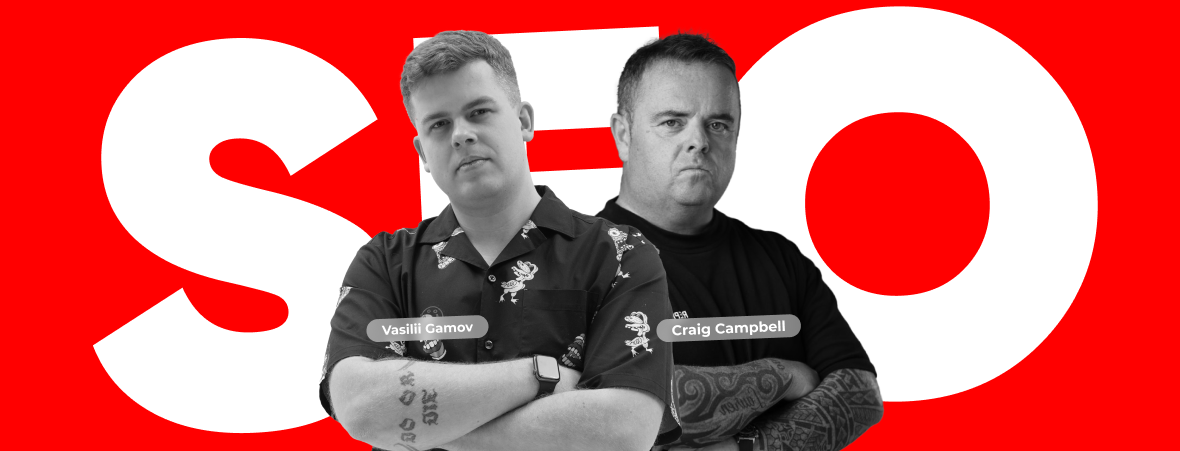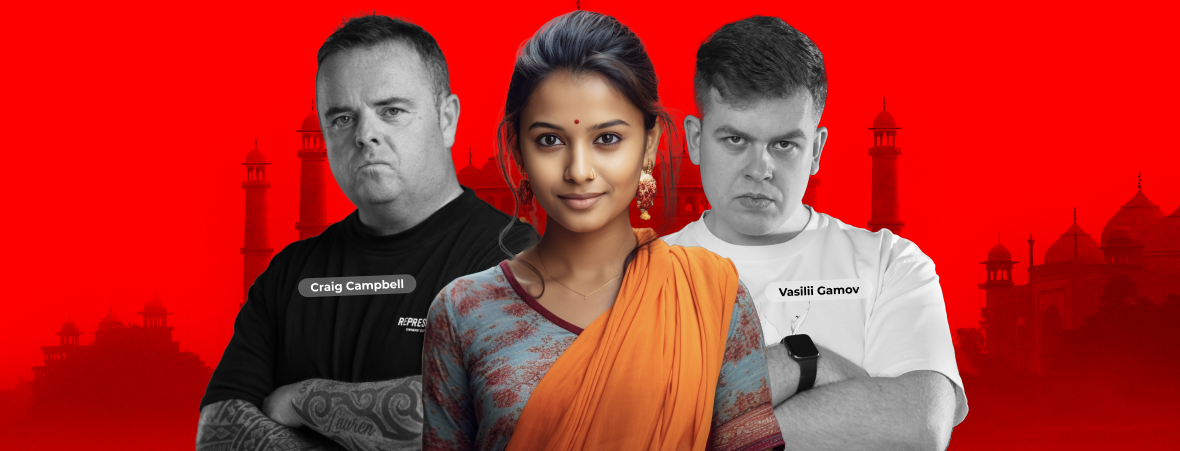We’re happy to share with you the biggest highlights of one of our recent interviews. Vasilii Gamov, CEO of Peaky Ads Marketing Agency, and Craig Campbell, a renowned SEO expert and consultant, had a spirited discussion about the challenges of SEO in various markets. Check out our YouTube channel for the full video and stick around with this blog to get a quick scoop.
Expert Spotlight
Craig Campbell is a UK-based SEO expert with over 20 years in the trenches. He has spent two decades in SEO metaphorical trenches, thriving in the chaos of iGaming, dodging penalties, playing Google AI Overviews, and proving that when it comes to SEO, aggressive approaches often win. Craig has built and ranked hundreds of sites, spoken at global conferences like SiGMA and Affiliate World, and currently serves as CMO at ODIS Global, a leader in aged domain acquisitions. Whether through affiliate marketing, YouTube, or education, Craig’s focus remains consistent: test what works and then exploit the hell out of it.
Regulated vs. Unregulated SEO
If you think the same SEO strategy works in every market, you’ve already lost. In iGaming where regulations often change overnight and Google updates can wipe you off the map, one-size-fits-all is basically a suicide. So, understanding whether you’re operating in a regulated or unregulated market isn’t optional.
In regulated markets like the UK or the Netherlands, online casinos must secure licenses, follow strict advertising rules, and tiptoe around platform bans. Even Google SERPs are sanitized: search for “online casino” in the Netherlands, and you’ll only see government-approved results. In tier-1 regulated markets, you’re playing SEO chess, it’s a long game.
In unregulated or gray markets — think Southeast Asia, parts of Latin America, or pre-2022 Brazil — the game is totally different, because you’re playing dodgeball on fire. You have 3–6 months to cash in before the penalties hit. No one’s checking licenses. SERPs are loose. Competition is fast and dirty.
Craig thrives in the chaos of unregulated markets, where ranking fast is the only goal and survival is temporary. And that’s the game. If you’re building a clean brand, cool — be patient. But if you’re just trying to rank and bank, you better move.
Pick Your Battles
Craig’s philosophy is ruthless: don’t waste time on keywords you can’t realistically hold. Especially not in risky markets where the clock’s always ticking. He targets lower-intent, easier-to-rank keywords in unregulated regions — it’s fast deployment, quick traffic, and fast turnover. In regulated markets, he invests in E-E-A-T, compliance, and brand building.
Unless you’re a licensed operator with a media budget, don’t chase tier-1, ultra-competitive terms. You’ll waste months and bleed out before you break even.
Instead, go after what’s winnable:
- Lower competition long-tail keys
- Bonus variations
- Region-specific search terms
- Unfiltered keywords in slow-update markets
You’ll rank faster. Convert better. And stay off the radar longer.
Here’s what Craig runs with globally:
- Aged domains: they must have backlinks, brand queries, and Google trust. Even better if they’ve been indexed in the last year.
- Subdomain piggybacking: buy any clean authority site (e-commerce, news, etc.), deploy an iGaming site, Google sees trust and gives you faster indexing and faster ranking.
- Viral CTR traffic: this is about using local IPs with volume that matches the keyword intent and then using it to spike rankings for medium to high competition terms.
- Redirect loops: when a site gets hit, redirect to another. Keep the link juice and CTR benefit flowing.
Craig’s strategy in volatile markets? Spin up 10+ sites simultaneously. All aged, all prepped with content, and all ready to rank. You hit traffic with CTR manipulation. You push links fast. And when Google eventually pulls the plug, you don’t panic. You redirect. You rebuild. You redeploy. It’s a churn-and-burn ecosystem. And it’s very profitable when done right. These sites won’t last long, but that’s the point: you just need them to rank before they die.
Content Strategy That Doesn’t Suck
You should also forget about one-page casino sites. Those died with the last Core Update. Whether it’s a short-term churn site or a long-term authority build, content has to show substance and do it fast. If you’re still deploying one-pagers, you’re wasting your crawl budget and your money.
Craig’s blueprint:
- Launch with 30+ pages
- Cover the basics: casino reviews, bonuses, payment methods
- Add real user value: offline listings, deposit comparisons, local currencies
- Keep it structured, clean, and indexable
And no, AI content isn’t a get-out-of-effort-free card. Instead, choose AI-assisted and human-reviewed. Otherwise, you will be building a penalty magnet.
Links That Don’t Care About Context
In most SEO playbooks, topical relevance is sacred. But let’s just say it: in iGaming link purity is a luxury. You can’t always get casino links, so you take what you can. A food blog? Sure. A plastic surgery domain? Why not. If it has traffic and trust, we can use it.
The link-building logic here is simple: there’s limited inventory, everyone’s using dirty tricks, and Google keeps rewarding it. Just try and look at the top-ranking iGaming sites: half their links will be complete garbage. But if Google allows it, we can replicate it and exploit it. So you work with what you can get — and sometimes that means links from construction blogs, cooking forums, or expired PBNs that still pass juice.
You still want anchor diversity, home page links, and a smart interlink structure, though. But topical purity? Nice in theory. Useless in practice.
AI Content and SEO
Let’s settle this first: Google absolutely does penalize AI sites. Craig has tested pure-AI deployments that get traffic for 3–4 months and then fall off a cliff with zero recovery path. No warnings. No index. Just ghosted. The fix? Use AI to build draft structures. Then human editors clean it up. Add unique data, polish the structure, and make it crawlable. That’s the sweet spot, it’s cheap, fast, and still safe, at least for the time being.
Craig doesn’t sugarcoat the direction of the industry. AI search is eating organic clicks, and Google’s updates are more erratic than ever. But in his view, it’s not the end, it’s a shifting battlefield. SEOs who adapt win, those who cling to best practices lose.
Ranking in Google AI Overviews
Google’s AI Overview is already rewriting how search works — and yes, it can be gamed. The secret lies in the citations. Not backlinks. Not domain rating. Just the number of trusted sources saying the same thing over and over.
As a part of an experiment, Craig’s team is currently trying to dethrone Brighton SEO as the “best SEO conference in the UK” by repeating that claim across dozens of respected sources for a rival event. It’s already showing up in AI sources. It doesn’t stop there. Craig is also in an identity war with a famous American singer — also named Craig Campbell. The goal is to become the top Craig Campbell in ChatGPT, Google AI, and beyond. This will, however, require gaining a search volume that is substantially bigger than that of the singer.
Forget organic position #1. Google AI Overview is the new top spot, and it’s insanely easy to manipulate for now. No backlinks. No schema. No EEAT. Just citation volume on trusted domains. The playbook:
- Pick your statement (“Best casino affiliate site in India”)
- Say it 30–50 times on real, semi-trusted sites
- Watch Google and ChatGPT swallow it whole
Scary? Yes. Effective? Also yes.
The Final Word
iGaming SEO isn’t about playing it safe, it’s about calculated aggression. iGaming SEO rewards speed, execution, and flexibility. Not compliance checklists and wishful thinking.
If you’re working in gray markets, you’re already in the mud. Embrace it, build fast, and rank fast. Most importantly, move before the penalties hit. And if you’re trying to build a real brand? You still need to understand how black hat tactics work, because your competitors are using them.
Google changes the rules weekly. Regulators change them monthly. Your only constant is not being constant. SEO’s not about doing what Google says. It’s about doing what works, before they figure it out. Here’s what works right now:
- Age your domains
- Spike traffic with CTR
- Stack smart content
- Multiply your attack points
- Manipulate AI Overviews before Google patches the hole
Want more? Follow Craig Campbell on LinkedIn and YouTube for case studies, live experiments, and unfiltered SEO truth. And subscribe to Peaky Ads for more deep dives into global markets.









